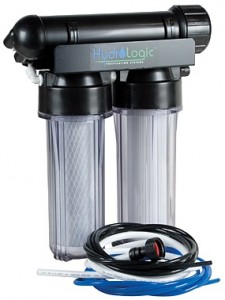Water quality is definitely a determining factor of the outcome in your hydroponic garden. Persistent problems in hydroponic systems are often traced back to the water supply. Water is the basic transportation in a hydroponic system, dissolving and transporting nutrients to the plants. However, water also dissolves impurities. These impurities cannot be easily detected visually, if at all, and can be harmful to plants. Growers commonly make incorrect assumptions about the purity of water, solely basing it on clarity. Assuming that the crystal clear, odorless water they get from the tap is pure water, and in turn should be safe for their plants. After all, it’s safe for people to drink…so why not your plants, right? Wrong.
Plants tend to be more sensitive to certain water treatments than people. There are often impurities left in “Safe Drinking Water” that are a problem for your plants, especially in a hydroponic system. City water supply specs for drinking water vary from city to city. City water supplies are generally treated with chloramine or chlorineto bring them to drinking quality. These specs are for making water safe for people, not plants. In a perfect world, the solids in tap water should be mostly calcium, magnesium, and some trace minerals. In actuality much of the starting ppm consists of unknown contaminants. There is no way to know, without a full lab analysis, how much of the starting ppm is minerals that are good for plants and how much are contaminants. Contaminants include agricultural and/or urban runoff, industrial waste, sewage, leaves, silt, plankton, etc. Piping and plumbing have also been known to release metals into the water. This is a problem because if your starting ppm is 500, and your target is 700, you will only be able to add 200 ppm of proper nutrient value! Your plants should be receiving 700 ppm of proper nutrient value.
Starting with pure water, 0 ppm, allows you to add every part of nutrient value in the precise quantities required during each phase of growth. Being able to accurately control the content and ppm of your plant food will give you the ability to produce incredible results and have abundant harvest every time. Starting with pure water will also help you avoid nutrient deficiencies or lockout problems. If you do not start with pure water, we recommend having your water tested prior to using it in your garden. Bad water quality can lead to numerous problems such as mineral toxicity, stunted growth, mineral/salt build-up, bacterial contamination, etc. The good news is that in most cases, water quality issues have simple solutions that do not involve complicated procedures or techniques. A reverse osmosis filter with a KDF carbon cartridge will get you pure water without chlorine or chloramine, which is ideal for your plants. There are also inexpensive in-line filters that can be attached right to your faucet/hose that remove solids as well as chlorine and chloramine. Stop by or call today and let us help you get the most out of your water!


